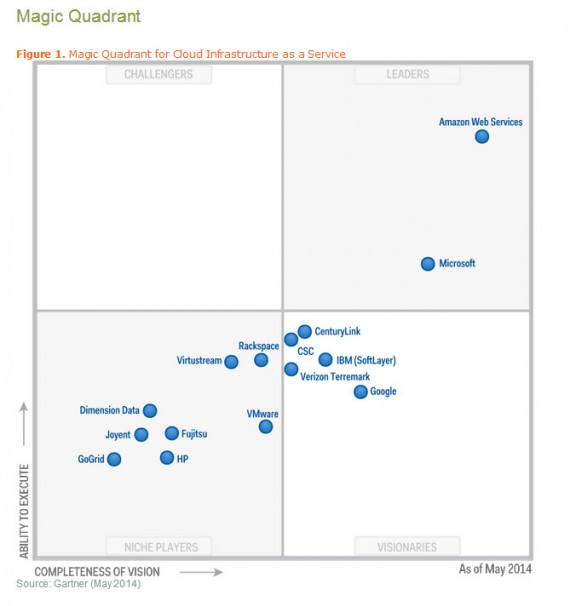Amazon Web Services is a cloud computing platform that could help online retailers store data, speed up websites, or better understand large volumes of customer data.
In a May 2014, Gartner described Amazon Web Services (AWS) as “a cloud-focused service provider with a very pure vision of highly automated, cost-effective IT capabilities, delivered in a flexible, on-demand manner,” and placed AWS in the upper right of its Magic Quadrant analysis, meaning that AWS was a complete and effective solution for online businesses.

Gartner placed AWS in the upper right of its Magic Quadrant analysis.
As small and mid-sized ecommerce operations grow, they often have trouble scaling to meet site traffic demands, memory requirements, and storage capacity. The result can be poor performing websites, down time, or even the feeling that a company is fighting its servers and platforms rather than benefiting from them. The cost of hosting can also go up, with some businesses paying as much as $2,000 per month or more to host a Magento installation with 10,000 products, as an example.
AWS’s Strengths
The Gartner analysis identified several strengths of AWS, not the least of which was the service’s market share and visionary leadership in the space.
AWS “is the overwhelming market share leader, with more than five times the cloud IaaS [infrastructure-as-a-service] compute capacity in use than the aggregate total of the other 14 providers in this Magic Quadrant. It is a thought leader; it is extraordinarily innovative, exceptionally agile, and very responsive to the market. It has the richest array of IaaS features and PaaS [platform-as-a-service] -like capabilities, and continues to rapidly expand its service offerings. It is the provider most commonly chosen for strategic adoption,” Gartner’s report said.
AWS also benefits from having many third parties that have written integrations or that can “offer assistance with adopting its platform,” again according to Gartner.
From the perspective of an ecommerce business, AWS, like other cloud IaaS providers, can offer the flexibility and scalability required to improve site performance and manage peak shopping periods like Cyber Monday.
Things to Watch with AWS
Gartner also noted that AWS is the price leader in the industry, making it relatively less expensive than some other solutions, but the report also cautioned that AWS “charges for optional items that are sometimes bundled with competitive offerings. This increases the complexity of understanding and auditing bills. Prospective customers should be careful to model the costs accurately, especially for network-related charges, and to compare the costs of reserved and unreserved capacity, as well as AWS’s ‘spot pricing’ market.”
AWS also offers several layers or levels of support, which — while helpful for customer service — can add costs.
Finally, AWS is really not a service for technology novices. It will be important to have IT professionals or developers to help deploy almost any AWS offering.
Key Services for Ecommerce Businesses
AWS had 29 different services available at the time of writing, include server solutions, database solutions, development tools and management, and even messaging solutions. Each with different price models and purposes.
For a growing ecommerce operation, there is a small set of AWS offerings that might help the most, including Elastic Compute Cloud (EC2), S3, and CloudFront.
EC2
Amazon EC2 is a web service that allows users to scale websites and applications to meet demand.
Every ecommerce site requires a server. For small and mid-sized sites, servers are often provided via a hosting company. But these servers tend to be somewhat static. A site has this kind of server with a certain amount of storage, memory, and processing capabilities.
EC2 allows a business to have a server or many servers. If a need should arise, it is possible to quickly add server capacity to manage a spike in traffic or business. When the peak period is over, it is just as easy to scale back. The process can even be automated so that a site always has the proper capabilities to meet demand.
Putting a site on EC2 is more complicated that putting a website on some other web hosts, but once it place, EC2 can be more cost effective and better performing than some other options.
S3
Amazon Simple Storage Service (S3) is a storage solution for the Internet. Ecommerce businesses can use it to house downloadable products like software or ebooks or use it to store product images a video. Merchants could even host a website or website files from S3.
CloudFront
Amazon CloudFront is a content delivery network (CDN) that makes it relatively easy to distribute content to shoppers with very low latency, meaning the time interval between when a request is made and when a response is available. This is especially helpful with product images. CloudFront could distribute images so that they load more quickly for end users.




